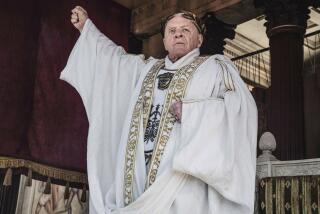Profile of an Imperialist
- Share via
“The Civil War” and this season’s “Liberty” were U.S. historical documentaries on PBS that spoke grandly for themselves. However, the British are still much better than Americans at telling their history through TV drama, often doing so with a richness and vibrancy that seduce even non-Anglophiles.
A striking case is the six-hour “Rhodes.” Yes, six hours, nonetheless a robust, commanding-despite-flaws biography of Cecil Rhodes, the British mega-imperialist whose self-canonizing efforts in southern Africa in the late 19th century touched off intercontinental mayhem that was to resonate indefinitely.
Created in conjunction with Boston’s WGBH-TV and Canadian and South African TV, “Rhodes” has already aired on the BBC and now comes to PBS in two-hour slabs, the first airing Sunday as part of “Masterpiece Theatre.”
Martin Shaw’s seethingly driven, corrupt, enigmatic Rhodes--a life force all to himself--is a huge performance of passion and subtlety not easily forgotten. Nor is the panoramic stage he occupies in a teleplay written by Antony Thomas, directed by David Drury and filmed entirely in South Africa. The latter’s collaboration is especially notable given that “Rhodes” so vividly documents the evil of its subject’s race-supremacy notions (while acknowledging his talents), something that only a few years ago would have enraged pre-Mandela white South Africa. In fact, the South Africa-born Thomas conceived “Rhodes” after being banned from his native country in 1977.
Rhodes was the Britisher who, after arriving in southern Africa while still a teenager, ultimately cornered the world’s diamond market in the 1880s and brutally seized hundreds of thousands of square miles that he modestly named Rhodesia, helping to spark the Boer War and inspire what would become the codified racism of apartheid.
The usual advisory about docudrama applies here. All history is subject to interpretation, and film and TV accounts inevitably cut at least some corners for the sake of the show. So watch with care.
Beyond argument, it seems, is that the real Rhodes was a mercurial figure of soaring vitality and influence. Shaw’s Rhodes is in part a ruthless visionary, a cunning, ravenously mercenary dreamer who resolves to “secure Africa for the white race.” And, specifically, for himself, it turns out, with a British officer defining him at one point as “monstrous greed hiding behind a thin mask of patriotism.” Not a nice guy.
Rhodes and his well-greased co-conspirators ride across these killing fields to conquest and power, his plan being to drive surviving natives into reserves whose conditions are so deplorable that they’ll be forced to sell their labor cheaply to whites.
There is nothing he won’t do to serve his ambitions. That includes mass bribery (his money doesn’t just talk, it bellows), turning Christian missionaries into gunrunners, getting the troublesome Chief Lobengula (wonderfully played by Washington Sixolo) hooked on morphine, and funding a small, modernly equipped personal army to conquer tribal lands and massacre opposition. There is a sense here of mismatched dueling robber barons, with the vanquished despot Lobengula himself being a lower-case version of Rhodes, the latter inevitably triumphing because of superior guile and firepower.
In one especially poignant sequence contrasting their fates, Rhodes strides victoriously down a red carpet between both applauding houses of Parliament in London while across the seas the rotund Lobengula and a top lieutenant pad off into the bush to take their own lives.
Thomas gives Rhodes dimension, though. More than just an obsessed, empire-building bully, he displays an incongruous tender side, too, as when temporarily turning his back on profit to nurse his dying young companion, Neville Pickering (Raymond Coulthard). Although the unmarried Rhodes’ relationship with Pickering and a succession of beautiful male secretaries are an unmistakable homosexual subtext, “Masterpiece Theatre” host Russell Baker clouds matters by calling this “passion” for such young men a “puzzle.” Thomas did not write it as a puzzle.
At least as confusing are a scheming real-life Russian princess (Frances Barber), who is clumsily thrust into Rhodes’ life here as a dramatic device, and the thick maze of Machiavellian politics in Africa and England on which the fate of Rhodes’ grand strategy is said to rest. Moreover, U.S. viewers may have a devil of a time decoding the cockney dialect of Rhodes’ chief business rival, Barney Barnato (Ken Stott).
Not to worry, though. “Rhodes” is otherwise so strong, and Shaw so persuasive, that these blemishes tend to fade, as parallels with the conquest of America’s Old West grow ever sharper. From his horse, Rhodes surveys the broad region he has seized. “My country,” he says joyfully, proclaiming the white mantra that will echo through southern Africa during much of the coming century.
* “Rhodes” airs Sunday through Tuesday at 9 p.m. on KCET-TV Channel 28.
More to Read
The complete guide to home viewing
Get Screen Gab for everything about the TV shows and streaming movies everyone’s talking about.
You may occasionally receive promotional content from the Los Angeles Times.






